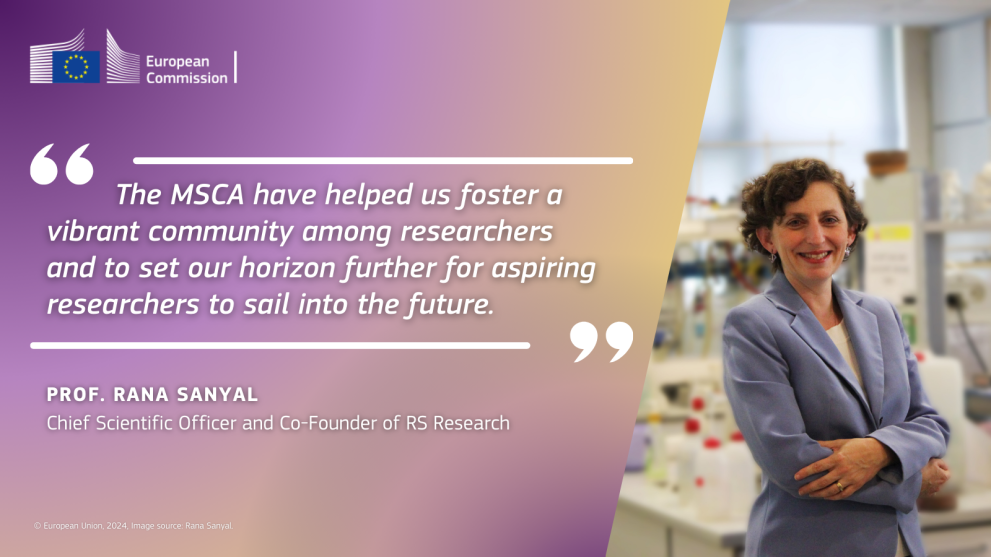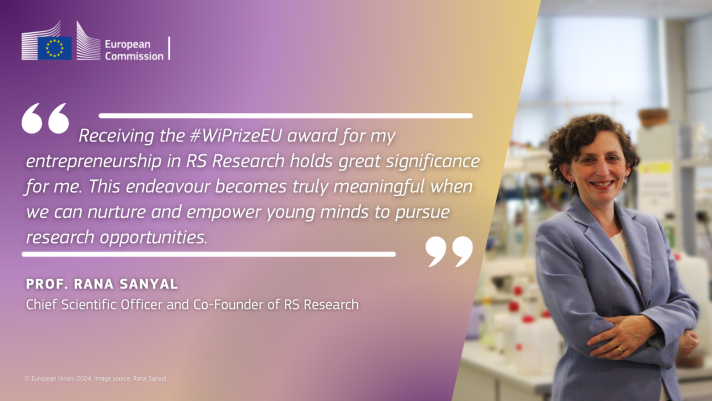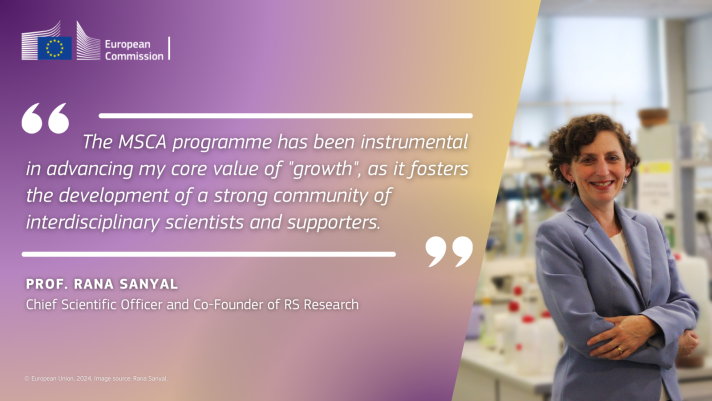
In March 2024, the European Commission announced the winners of the 10th edition of the European Prize for Women Innovators. The prestigious EU prize is awarded to women from across the EU and countries associated to Horizon Europe, whose innovations are driving positive change for people and our planet. This year’s winner in the Women Innovators category is Prof. Rana Sanyal, former and current Marie Sklodowska-Curie Actions (MSCA) beneficiary, for her successful work in the field of biotechnology.
We spoke to Prof. Sanyal, who has been the Director of the Boğaziçi University Centre for Life Sciences and Technologies, an international centre of excellence, since 2013. She is the inventor or co-inventor of over 50 issued patents and pending applications. In 2021, Prof. Sanyal was also awarded a Cartier Women’s Initiative Global Science and Technology Pioneer Award fellowship, along with other recognitions over the years. Her academic spin-off, RS Research, is a next-generation biotechnology start-up, developing smart nanomedicines for targeted chemotherapy. It translates research into the clinic, with the patented drug delivery platform Sagitta. Its groundbreaking technology increases the effectiveness of chemotherapy while reducing side effects.
Winning this year’s European Prize for Women Innovators is a remarkable achievement. How do you envision leveraging this recognition to inspire and support women interested in pursuing careers in STEM fields?
Out of the 400 undergraduate and graduate researchers who have joined my lab over the past 20 years, 300 were women. There’s no gender when we wear our lab coats. In my lab and start-up, I’ve asked job applicants the most difficult questions. And it wasn’t surprising that female candidates had an obvious advantage, having developed their stamina and capability of seeing the big picture due to the multiple roles they have to assume in their daily lives. I have and will continue to dedicate a significant amount of time delivering speeches to communities across Türkiye to encourage young people to follow STEM careers. At our start-up, I am proud to have over 80% female colleagues.
How did you get into your particular field of research?
After receiving my undergraduate degree in chemical engineering in Boğaziçi University in Türkiye and a PhD in chemistry from Boston University in the USA, I started my career as a researcher at Amgen Inc. in California. This allowed me to gain extensive experience in medicinal chemistry.
In 2004, I returned and joined Boğaziçi University’s Department of Chemistry, investigating drug delivery systems that avoid chemotherapy’s side effects while still wiping out cancer cells. I am passionate about making a difference in people’s lives. This has led me to develop the first ever novel drug candidate of Türkiye, reaching patients at Phase I clinical trials in 2021.
Have the MSCA helped to advance your pioneering innovations in the field of nanomedicine?
When I needed it most, the MSCA empowered me with my most precious core value – ‘courage’. The FP6 Marie Curie International Reintegration Grant (IRG) DRUG DELIVERY SYSTEM for example served as a vital resource for my newly established independent research lab at Boğaziçi University. Being the first Marie Curie IRG project funded in Türkiye, not only marked a significant milestone in my career and research, but also served as an inspiration for future researchers.
How have the MSCA helped foster academia-industry cooperation and diverse skillsets in your staff?
I enjoy seeing many of my students and co-workers gaining invaluable experience through the MSCA projects BIOTIN, LungCare and the recently funded MSCA Doctoral Network NATPRIME. The MSCA have helped us cultivate a vibrant community among researchers from both the academic and non-academic sectors, and to set our horizon further, also for aspiring researchers to sail into the future. The collaboration between academia and the private sector is precious and helps us drive innovation as we bring together different expertise, perspectives and methodologies. This also helps us all acquire new competences in many different areas.
How has your participation in EU-funding, especially the MSCA, helped advance your research and the careers of your team? Do you have any advice for potential applicants to the MSCA Staff Exchanges Action?
Receiving the #WiPrizeEU award for my entrepreneurship in RS Research holds great significance for me. This endeavour becomes truly meaningful when we can nurture and empower young minds to pursue research opportunities. The Marie Skłodowska-Curie Actions programme has been instrumental in advancing my core value of ‘growth’, as it fosters the development of a strong community of interdisciplinary scientists and supporters. Witnessing my students flourish not only into bright stars across the globe but also making substantial contributions to science, is my biggest pride!
Moving to a different country is scary, it means getting out of one’s comfort zone. But that is what makes us grow, what makes us experience things we would otherwise not have. I do not like giving advice, but I would like to wish courage to all scientists who are thinking of applying. This will be an experience you will definitely be glad you had. Tomorrow belongs to the people who can give up their comfort today!
Looking ahead, what are some projects or initiatives at RS Research and PDC Therapeutics that you are particularly excited about, and how do you envision them contributing to the EU Mission Cancer, for example?
The pandemic has made us question the efficiency of our ecosystem. Now we know that there’s no single route to developing treatments and financing businesses. At RS Research, we are very close in proving that our technology is game-changing. We have the expertise of translating R&D from a research setting of novel nanomedicines to a clinical setting. We are ready for our role in the EU Mission Cancer. Our aim is to deliver impact in changing the narrative about cancer, by combining our research and innovation with new collaborations. We will continue to develop new technologies and products, not only in the treatment, but also in diagnostics. Our experience will strengthen our partners - together we will shape the future of oncology.
More information:
Marie Skłodowska-Curie Actions funding opportunities
Factsheet MSCA: Developing Talents, Advancing Research
Factsheet MSCA: Almost 30 years of European support to researchers
Boğaziçi University Centre for Life Sciences and Technologies
Details
- Publication date
- 3 July 2024
- Author
- European Research Executive Agency


